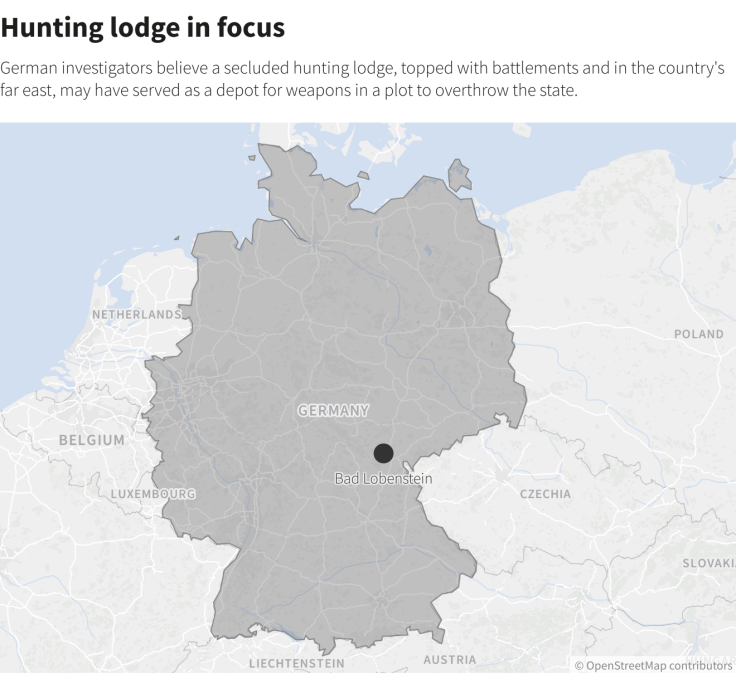German Coup Plot Investigators Focus On Secluded Hunting Lodge
German investigators in the small eastern town of Bad Lobenstein on Thursday searched a secluded 19th century hunting lodge owned by a local aristocrat who is at the centre of a coup plot that has shocked Germany and left residents bewildered.
Police surrounded the Waidmannsheil hunting lodge, which belongs to Heinrich XIII Prinz Reuss, and sits just outside the town in a wooded area, amid suspicions that it served as a depot for weapons and meeting point in the planned coup.
The plans came to light on Wednesday with the detainment of 25 members and supporters of a far-right group that the prosecutor's office said was preparing the violent overthrow of the state to install as national leader the 71-year-old aristocrat who had sought backing from Russia.
Town officials and police said that Heinrich owns the hunting lodge outside Bad Lobenstein, a small, neo-Gothic style castle with a turreted tower and battlements. They said the family bought back the property in 1990 after the fall of the Communism and restoring it after it served as a youth hostel.
Heinrich, one of the last descendents of a dynasty that once ruled over swathes of eastern Germany, was arrested in Frankfurt on Wednesday.
One of the dozens of police officers on the scene on Thursday said they had worked through the night to look for evidence that included weapons and explosives. He spoke on condition of anonymity because he wasn't authorized to speak publicly about the ongoing investigation.
Federal prosecutors in Karlsruhe didn't immediately respond to questions about the search.
GRAPHIC: Hunting lodge in focus (

)
Bad Lobenstein is a holiday spa town with around 7,500 residents in the eastern German state of Thuringia. Its founding dates back to before 1250, according to its website.
Now, some residents say, the town has become a focal point for the so-called Reichsbuerger (Citizens of the Reich), causing divisions in the community.
Reichsbuerger do not recognise modern-day Germany as a legitimate state. Some of them are devoted to the German empire under monarchy, while some are adherents of Nazi ideas and others believe Germany is under military occupation.
Deputy mayor Andree Burkhardt said that the prospect of a coup "terrified him".
Burkhardt, who worked for years installing tiled stove ovens, said he and other residents this summer received anonymous letters saying they weren't German and to report to the management of the Reuss family to get their papers.
The house of Reuss did not respond to requests for comment. Heinrich's office in Frankfurt did not immediately respond to an email seeking comment on the search of the hunting lodge.
"I'm not afraid. Because democracy is in place and authorities have a grip on the situation, but I'm certainly worried about the way things are going," he said from his office in the town hall.
At the base of a hill below the hunting lodge were nine police vehicles, a tent, floodlights, and the hum of a generator.
Police prevented reporters from getting close to the premises but at least four dark unmarked vehicles parked directly before the entrance were visible. Uniformed officials went in and out the front door.
A man walking a British bulldog said he had no problem with the Reichsbuerger and wouldn't be upset if the coup had been successful.
Freedom of expression was being suppressed, he said, speaking on condition of anonymity because he is a business owner and didn't want to draw attention to himself.
Back in town on the main square, retiree Klaus Schwalbe said that he heard Reichsbuerger march through the city every Monday with drums.
"But I have other worries - money," he said.
Juergen Spoerl, outside the local savings bank, distanced himself from the movement.
"They have strange views," he said. "We don't want to have anything to do with them."
A man who would only identify himself as Wolfgang said he had also received a letter in the summer demanding he report to Reuss authorities.
The division in the community "really worries me", he said.
© Copyright Thomson Reuters {{Year}}. All rights reserved.





















